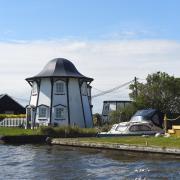In the months after finishing her compelling new novel Rose Tremain found herself uncomfortably close to the themes of disease and mortality which haunt it

Rose Tremain’s new novel is an exhilarating exploration of love, life, loss and death.
Islands of Mercy is the Norwich writer’s first book since she was made a Dame for services to writing last year and is a thrilling and seductive story set in 19th century Bath, London, Ireland, Paris and Borneo. It connects its finely drawn characters, forging, following, seeking or stepping away from ways through life, by a mesh of physical pathways, roads and sea-voyages, and by relationships between lovers, siblings, fathers and daughters, medics and patients, masters and servants.
The atmosphere and detail of each section is so vivid and beguiling it would be easy to want to linger, in the restorative waters, tearooms and surgeries of Bath or the raw and all-consuming life and death of the rainforest, if the trail the author threads through interlinked households and ideas was less compelling. Short chapters and swift scene changes drive the story on, in counterpoint to an underlying theme of the dangers and delights of straying from the path.
Dame Rose Tremain, former chancellor of the University of East Anglia, explained the inspiration for Islands of Mercy. “I wanted to explore some universal themes – sexual entrapment, material striving, loss of love, untimely death and more – in two absolutely contrasting locations and see how, as human dilemmas, they nevertheless mirror each other,” she said. “In 1865, when the novel is set, the genteel city of Bath in southern England and the unexplored island of Borneo in the Malay Archipelago seemed the perfect choices. The mental friction experienced by going from one place to the other would have been profound.”
She wrote the book at home in Norwich, researching Borneo via the letters of Victorian naturalist Alfred Russel Wallace and novelist Joseph Conrad. “If I’d written this book 10 years ago I would have gone there. At age 76 I just don’t have the necessary energy for that kind of exploration,” she said. “I write all my books at home now. When I was starting out as a writer, I could write anywhere. I once wrote an entire short story in the old-fashioned buffet on Liverpool Street Station. Now, the quiet and familiarity of my own study in Norfolk feels like the safest place to write.”
One of the themes of the book is the urge to find or create places of sanctuary. Rose’s own sanctuaries include her study and kitchen, the Romantic Garden at Swannington where she and her partner, writer Richard Holmes, buy topiary and trees for their garden, a spa she visits each spring with her daughter, and even the second floor café in John Lewis, Norwich. She also loves Norwich city centre, Winterton beach and Blickling gardens and park.
However, since lockdown she has been at home. “In October/November 2019 I was a patient for 38 days in Addenbrooke’s Hospital, being operated on for pancreatic cancer. My health is recovering slowly now, but Covid would probably kill me,” she said.
The heroine, or one of the heroines, of Islands of Mercy, is Jane, ‘the angel of the baths’ adored for her nursing skills, noted for her singular stature and strangely certain she is travelling towards some remarkable destiny. Her fellow travellers include her father, her suitor, her artist aunt, an inordinately lovely woman who collects lovers and teaches love, a bright and beautiful butterfly hunter, a girl from the slums reinvented as a tearoom proprietor and a wildly rich man who is slave to his passions.
It might seem prescient, but is simply a sad coincidence, that Rose wrote this novel, infused with themes of disease, including a deadly virus, just before she became ill with cancer, and the world succumbed to a pandemic. Her previous book was an autobiography, but she has no plans to return to her life story. “I was interested to explore my peculiar childhood and my neglectful parents, but invariably, if writers go further into their lives, they wound some people still living, and this is not what I want to do,” she said. Instead she is writing a novel featuring a Victorian foundling, murder and justice.
Rose’s novels and short stories have been published around the world, winning many literary prizes. Restoration was shortlisted for the Booker prize and Rose has also been a Booker judge.
She came to Norfolk to study at UEA “I was stricken with wonder at the wide skies and the feeling of remoteness in the 1960s,” she said. “I arrived in 1964, when everything was more or less brand new. Most memorable to me were the things our year were able to start up: a student magazine and a thriving drama group. And oh yes, I loved reciting Shakespeare in the old golf course bunkers where the ziggurats now stand.”
She returned to live in Norwich in the 1980s and became the first woman, the first writer and the first UEA graduate to become chancellor of the university.
For several years she taught on the world-famous creative writing MA course, which celebrates its 50th anniversary this year. Alumni include novelists Ian McEwan, Kazuo Ishiguro, Anne Enright, Tracy Chevalier and John Boyne. The first of its kind in the country, and still the most prestigious creative writing programme in the UK, anniversary celebrations are due to run all year.
Islands of Mercy by Rose Tremain is published by Chatto and Windus on September 10 for £18.99.




























